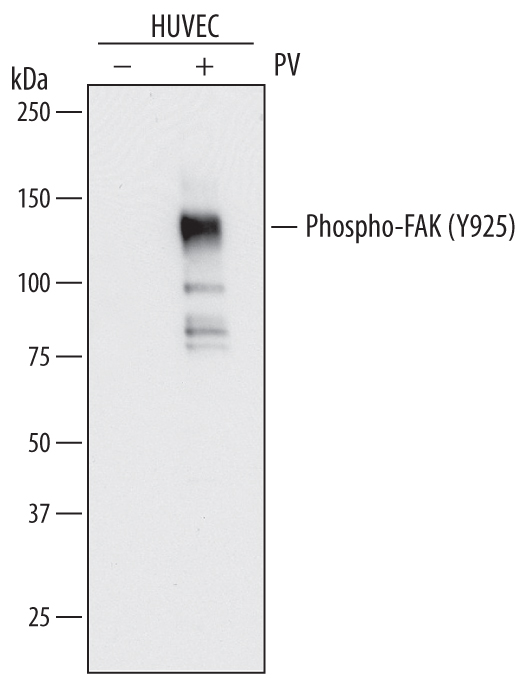Human Phospho-FAK (Y925) Antibody Summary
Applications
Please Note: Optimal dilutions should be determined by each laboratory for each application. General Protocols are available in the Technical Information section on our website.
Scientific Data
 View Larger
View Larger
Detection of Human Phospho-FAK (Y925) by Western Blot. Western blot shows lysates of HUVEC human umbilical vein endothelial cells untreated (-) or treated (+) with 1 mM Pervanadate (PV) for 5 minutes. PVDF membrane was probed with 0.5 µg/mL of Mouse Anti-Human Phospho-FAK (Y925) Monoclonal Antibody (Catalog # MAB44671) followed by HRP-conjugated Anti-Mouse IgG Secondary Antibody (Catalog # HAF007). A specific band was detected for Phospho-FAK (Y925) at approximately 125 kDa (as indicated). This experiment was conducted under reducing conditions and using Immunoblot Buffer Group 1.
Reconstitution Calculator
Preparation and Storage
- 12 months from date of receipt, -20 to -70 °C as supplied.
- 1 month, 2 to 8 °C under sterile conditions after reconstitution.
- 6 months, -20 to -70 °C under sterile conditions after reconstitution.
Background: FAK
Focal adhesion kinase 1 (FAK) is a ubiquitously expressed nonreceptor protein tyrosine kinase that is concentrated in the focal adhesions that form between cells growing in the presence of extracellular matrix constituents. This cellular localization is directed by a "Focal Adhesion Targeting" (FAT) sequence, a 125 amino acid sequence at the C-terminus. FAK plays an important role in migration, cell spreading, differentiation, cytoskeleton protein phosphorylation, apoptosis and acceleration of the G1 to S phase transition of the cell cycle. Increased expression and/or activity of FAK in various tumors has been correlated with enhanced migration and invasiveness of human tumor cells in addition to promoting increased cell proliferation. Src-dependent phosphorylation of FAK at Tyr925 regulates the effect of FAK on cell migration and tumor angiogenesis. Human FAK contains one FERM domain (aa 35-355) and one kinase domain (aa 415-684). Alternate splicing generates additional isoforms with N-terminal and C-terminal truncations. Within aa 919-930 human, mouse, and rat FAK share 100% aa sequence identity.
Product Datasheets
FAQs
No product specific FAQs exist for this product, however you may
View all Antibody FAQsReviews for Human Phospho-FAK (Y925) Antibody
There are currently no reviews for this product. Be the first to review Human Phospho-FAK (Y925) Antibody and earn rewards!
Have you used Human Phospho-FAK (Y925) Antibody?
Submit a review and receive an Amazon gift card.
$25/€18/£15/$25CAN/¥75 Yuan/¥1250 Yen for a review with an image
$10/€7/£6/$10 CAD/¥70 Yuan/¥1110 Yen for a review without an image


